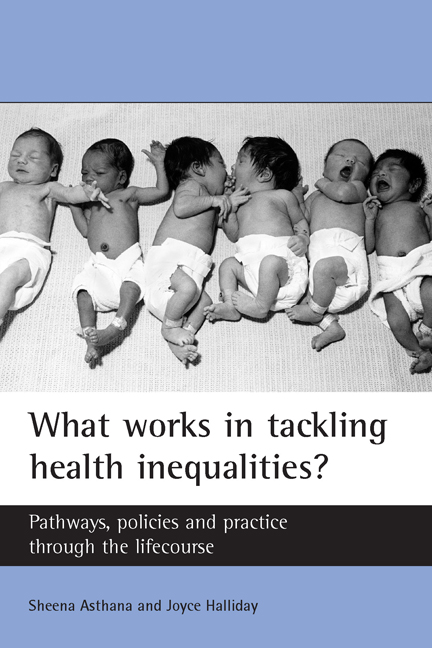Book contents
- Frontmatter
- Dedication
- Contents
- List of tables, boxes and figure
- Acknowledgements
- List of abbreviations
- one Introduction
- Part 1 The research and policy context of health inequalities
- Part 2 Health inequalities pathways, policies and practice through the lifecourse
- Part 3 Tackling health inequalities: developing an evidence base for public health
- Index
fourteen - Towards a new framework for evidence-based public health
Published online by Cambridge University Press: 14 January 2022
- Frontmatter
- Dedication
- Contents
- List of tables, boxes and figure
- Acknowledgements
- List of abbreviations
- one Introduction
- Part 1 The research and policy context of health inequalities
- Part 2 Health inequalities pathways, policies and practice through the lifecourse
- Part 3 Tackling health inequalities: developing an evidence base for public health
- Index
Summary
The evidence base in public health
During the course of this book we have examined a vast array of evidence pertaining to the effectiveness of interventions targeting key public health issues. This includes several hundred non-experimental studies which do not meet the strict criteria for inclusion in systematic reviews but which, nevertheless, throw important light on the complexities of implementing interventions and on the factors that may contribute to successful outcomes. Such studies, however, are not generally considered to be robust enough to provide the basis for definitive policy guidance. Thus, we have also drawn on a formal evidence base. This includes over 125 systematic reviews (36 of which were Cochrane Reviews consulted individually as opposed to information accessed via reviews of reviews) and 29 reviews of reviews. A conservative estimate suggests these are underpinned by a minimum of 1,800 experimental and quasi-experimental trials. As we discuss below, these different sources of evidence offer very different conclusions with respect to ‘what works’.
What works in addressing health inequalities? A summary of the formal evidence base
A table summarising the findings of systematic reviews has been presented in each of the policy/practice chapters. These suggest that the current evidence base is stronger for interventions implemented during adulthood than during earlier periods of the lifecourse. However, this is overwhelmingly accounted for by interventions targeting lifestyle factors at the individual level (diet, physical activity and smoking). By contrast, the evidence base for interventions that address the wider determinants of health (for example, housing, crime and employment) is very weak. There is a similar focus on interventions targeting lifestyle factors in earlier ages. Smoking and alcohol in childhood and adolescence, smoking cessation and nutrition in pregnancy and early life and, to a lesser degree, parenting education and support are the only other areas where the evidence base seems extensive (with consideration given to at least 50 trials). Thus, broadly similar areas of concern dominate across the lifecourse.
Even within the body of evidence focusing on lifestyle factors, disaggregation by topic area reveals how small the specific evidence base often is. With reference to breastfeeding, for example, most training courses for health professionals have not been formally evaluated, with research identifying only one randomised controlled trial (RCT) alongside two UK ‘before and after’ studies (NHS CRD, 2000).
- Type
- Chapter
- Information
- What Works in Tackling Health Inequalities?Pathways, Policies and Practice through the Lifecourse, pp. 565 - 598Publisher: Bristol University PressPrint publication year: 2006



